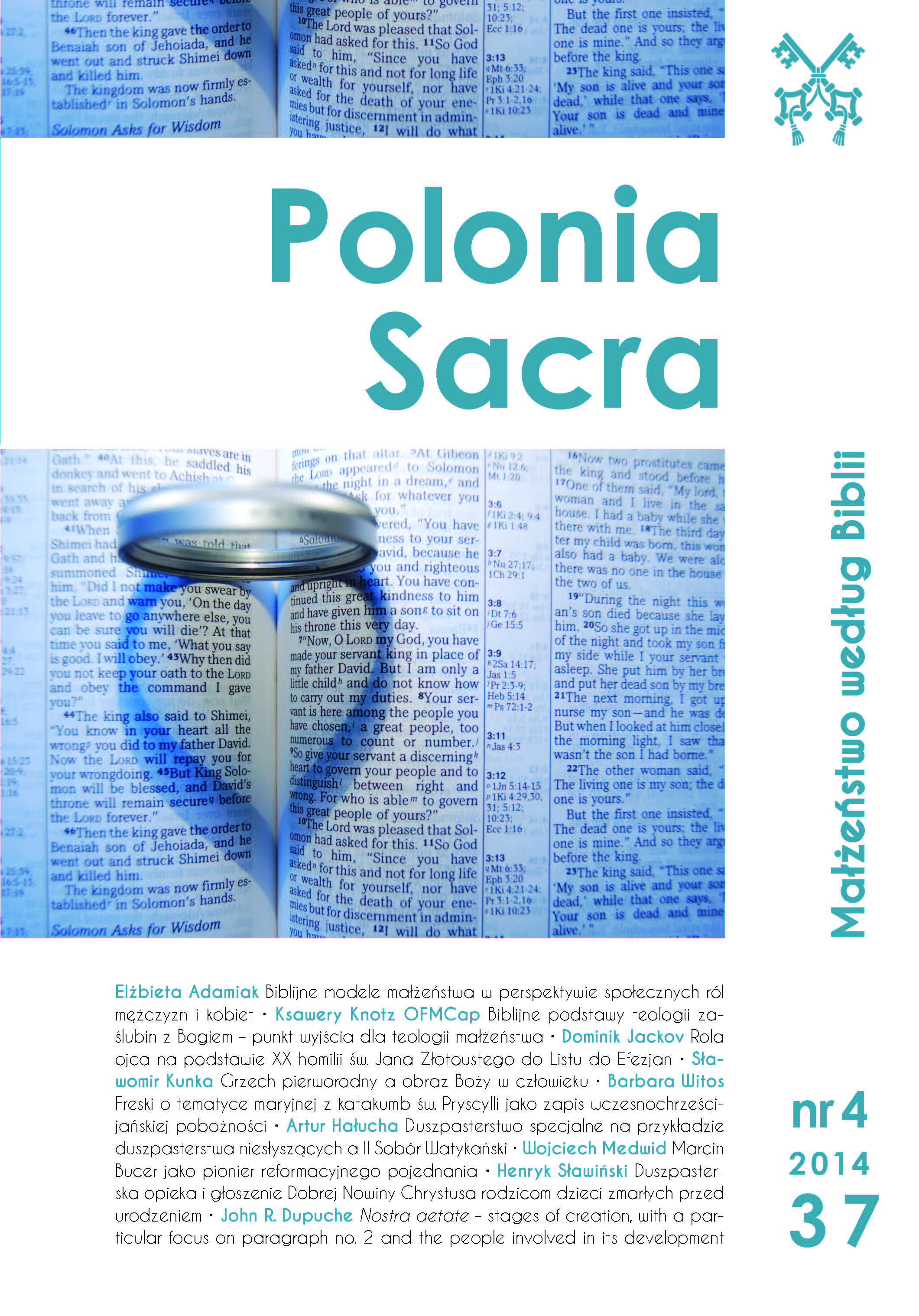Duszpasterstwo specjalne na przykładzie duszpasterstwa niesłyszących a II Sobór Watykański
DOI:
https://doi.org/10.15633/ps.741Słowa kluczowe:
duszpasterstwo, osoby niesłyszące, opieka duszpasterskaAbstrakt
W powyższym artykule została przedstawiona sytuacja duszpasterstwa specjalnego po Soborze Watykańskim II na przykładzie duszpasterstwa niesłyszących. Na wstępie wyjaśniono różnice pomiędzy duszpasterstwem specjalnym a specjalistycznym, kwalifikując osoby niesłyszące w zakres duszpasterstwa specjalnego. Następnie na kanwie zarysu historii duszpasterstwa niesłyszących przyjrzano się wpływowi Soboru Watykańskiego II na kształtowanie tegoż duszpasterstwa, ze szczególnym zaznaczeniem gruntu Kościoła w Polsce. Przeprowadzona analiza dokumentów soborowych pod kątem objęcia troską osób niesłyszących wykazała raczej brak troski niż troskę soboru wobec tych osób i zajęcie się nimi tylko przy okazji osób chorych i ubogich. Sobór nie okazał się też momentem przełomowym w dziedzinie duszpasterstwa niesłyszących, a działania na polu tego duszpasterstwa rodziły się oddolnie z inicjatywy gorliwych duszpasterzy, osób konsekrowanych i zaangażowanych świeckich.
Bibliografia
Brückner A., Słownik etymologiczny języka polskiego, Kraków 1927.
Bryła J., Głusi słyszą, Kraków 1998.
Chudy W., Powołanie osoby niepełnosprawnej w ramach nauczania papieża Jana Pawła II, [w:] Osoba niepełnosprawna i jej miejsce w społeczeństwie, red. D. Kornas-Biela, Lublin 1988, s. 123–149.
Dębski A., Głuchoniemi w Polsce, www.arturdebski.pl/wiadomosci/gluchoniemi-w-polsce (01.02.2014)
Dz.U. z 2011 nr 209 poz. 1243, www. isap.sejm.gov.pl (07.08.2014).
Effatha! Język migowy, red. B. Szczepankowski i in., Warszawa 2005.
Encyklopedia katolicka, t. V, red. L. Bieńkowski i in., Lublin 1989.
Jan Paweł II, Przemówienie podczas spotkania z osobami starymi, chorymi i ułomnymi, Wiedeń 1983, „L’Osservatore Romano” 4 (1983) 9, s. 10.
Kamiński R., Drożdż B., Duszpasterstwo specjalne, Lublin 1998.
Kirejczyk K., Głusi, Warszawa 1957.
Lameri A., La preghiera eucaristica della Chiesa tedesca per i non udenti, „Rivista Liturgica” 90 (2003), s. 135.
Leksykon teologii pastoralnej, red. R. Kamiński i in., Lublin 2006.
Lubos K., Ks. Bp Herbert Bednorz – Protektor Duszpasterstwa Specjalnego, „Śląskie Studia Historyczno-Teologiczne” 22 (1989), s. 41–49.
Nowak A., Duszpasterstwo głuchoniemych, Tarnów 1983.
Nowak A., Duszpasterstwo głuchoniemych, „Ateneum Kapłańskie” 76 (1984) 452, s. 84–95.
Pałyga J., Ludzie szczególnej troski, Warszawa 2003.
Referat wygłoszony przez ks. Jana Szywalskiego podczas Ogólnopolskiego Spotkania Duszpasterstwa Niesłyszących, Porszewice 20.03.2014. (w posiadaniu autora artykułu)
Sławiński H., Między ciągłością a zmianą, Kraków 2008.
Sobór Watykański II, Konstytucje, dekrety, deklaracje. Tekst łaciński i polski, Poznań 1967.
Szczepankowski B., Niesłyszący – głusi – głuchoniemi. Wyrównywanie szans, Warszawa 1999.
Szczepankowski B., Osoby duchowne zasłużone dla polskiej pedagogiki, [w:] Pedagogika chrześcijańska. Tradycja, nowoczesność, nowe wyzwanie, red. J. Michalski i A. Zakrzewska, Toruń 2010, s. 143–159.
Szczepankowski B., Słownik liturgiczny języka migowego, Katowice 2000.
Pobrania
Opublikowane
Numer
Dział
Licencja
Autorzy publikujący w czasopiśmie udzielają jego wydawcy zgody o następującej treści:
- Autor zachowuje autorskie prawa majątkowe do utworu, a jednocześnie udziela wydawcy czasopisma zgody na jego pierwszą publikację w wersji drukowanej i wersji online na licencji Creative Commons Uznanie autorstwa 4.0 Międzynarodowe oraz zgody na wykonywanie opracowań, w tym przekładów.
- Autor ma możliwość udzielania zgody niewyłącznej na opublikowanie utworu w wersji, która ukazała się w czasopiśmie (np. zamieszczenia go w repozytorium instytucjonalnym lub opublikowania w książce), wraz z informacją o jego pierwszej publikacji w czasopiśmie.
- Autor może umieścić swój utwór online (np. w repozytorium instytucjonalnym lub na swojej stronie internetowej) jeszcze przed zgłoszeniem utworu do czasopisma.

